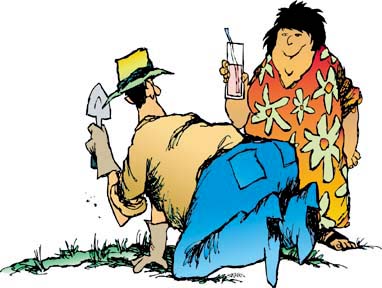
![]()
Think Inc.
A forum for Hawaii's
business community to discuss
current events and issues.

![]()
Think Inc.
A forum for Hawaii's
business community to discuss
current events and issues.
 |
Aloha She was an older lady, moving slowly, gray hair uncontrolled. The polka dots in her blouse clashed with the stripes on her skirt. I don't think she lived in the building. She stopped and raised her sunglasses for a thorough inspection, moving not only her eyes, but her head to the left, then the right. She then stepped to the edge of the sidewalk and bent at the waist.
A little can go a long way
By Rod Romig
"You're doing a very good job," she announced very deliberately. "It looks
very nice and I want to thank you."
"Thank you," she said a second time with emphasis.
The maintenance guy was on all fours with a trowel in his hand. He was digging weeds, policing candy wrappers and cigarette butts from a plot of land five feet wide, 20 yards long, bordered by a cement wall and the sidewalk. Just a little piece of land. But it had some nice ground cover that bloomed, some odd shrubs, and a few struggling palms.
Not much on the scale of things. Pass it 10 times in a day and you couldn't describe what was there. The maintenance guy came to his knees, raised his sun hat off his forehead, and with a slight smile replied simply, "Thank you." And off the lady shuffled.
That single act of respect and recognition gives me more hope for Hawaii than anything the legislature accomplished this session.
A society that respects those who maintain the infrastructure, and therefore maintain the quality of life, is a society with the strength of character to weather the economic and political storms that must eventually be endured. For those of us raised during the Eisenhower generation, this respect was a product of our own experience. Our fathers and mothers toiled in factories and on farms, and we had summer jobs where we came home with dirt in our socks and calluses on our hands. My early summer jobs were digging graves and sacking pinto beans.
My mentor Herman had an eye for shaving the sides of a grave that was masterful, nay artistic. A shovel was his brush and the earth was his canvas. Eldon was a whisp of a man, but he could guide five sacks of 100 pound beans into a space with the delicacy of my grandmother threading a needle. Respect was observed and earned.
I have seen this in Germany, respect for the arbiters, the workers. The Japanese cab driver in black suit and tie, white shirt and gloves also spoke to respect for all work, great and small. But I don't see it often in Hawaii. Perhaps it's a function of employment opportunities. Kids in my day had summer and after-school jobs that supported the infrastructure.
That gave us an appreciation for the stamina, patience, and often precision associated with these jobs. It's easy to belittle that which you do not understand.
Without these exposures there is the risk of us leaning much more to the class system of England, which exists yet today, though more muted and with new labels, or the caste system of India.
I don't wish to disparage these systems, but only to register a preference for a system that recognizes the efforts of all.
A system where we pause for a moment to thank the cleaning lady who sweeps our office halls, to appreciate the work of the guys who collect the garbage, to thank the bus driver for getting us safely home.
It's a better world because of the Hermans and Eldons, it's a lesser world when we don't recognize and appreciate their contribution.
Rod Romig is dean of the school of business administration at Hawaii Pacific University. Reach him at rromig@hpu.edu.
To participate in the Think Inc. discussion, e-mail your comments to business@starbulletin.com; fax them to 529-4750; or mail them to Think Inc., Honolulu Star-Bulletin, 7 Waterfront Plaza, Suite 210, 500 Ala Moana, Honolulu, Hawaii 96813. Anonymous submissions will be discarded.